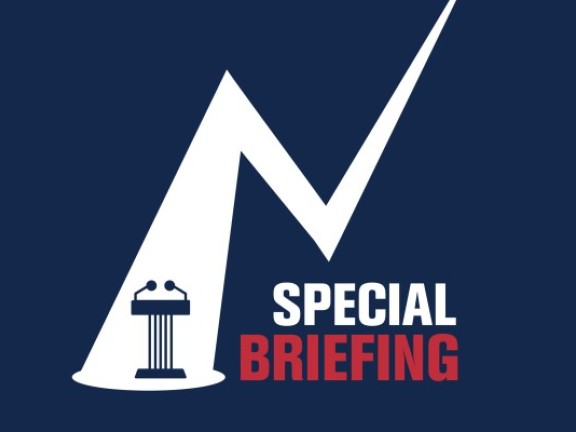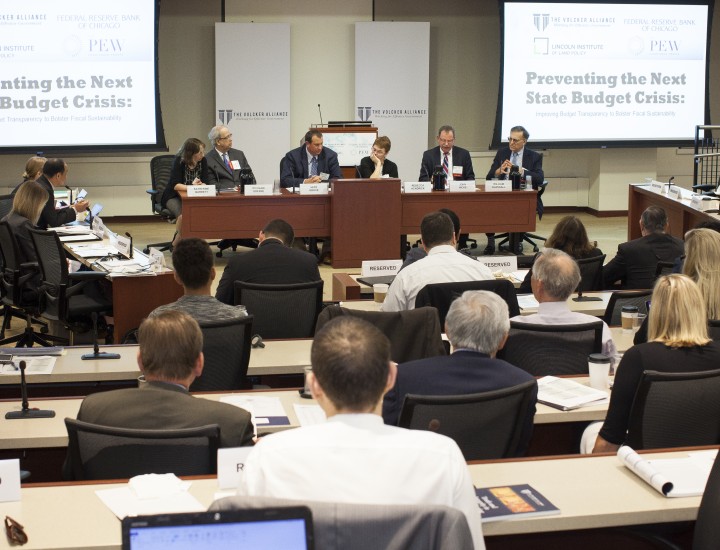Special Briefing on the Muni Debt Boom: Record Borrowing Amid Budget Strains

11:00AM
This Special Briefing focused on the record-shattering boom in state and local borrowing, even in the face of federal spending cuts and budgetary pressure.
The total U.S. muni bond sales this year are more than 20 percent ahead of 2024’s record $498 billion and may reach or even exceed $600 billion, according to some bankers’ estimates. The borrowing wave comes as estimated state and local deferred infrastructure maintenance reaches more than $1 trillion and climate-related investment needs increase even as the promise of federal funding wanes.
Our expert panel discussed how long the boom will continue in the face of conflicting federal, state, and local priorities, which will be the big question for investors and governments over the coming year.
Moderated by William Glasgall, Volcker Alliance Public Finance Adviser and Penn IUR Fellow, and Susan Wachter, Co-Director of Penn IUR, this briefing was the sixty-first in a series of sixty-minute online conversations featuring experts from the national research networks of the Volcker Alliance and Penn IUR, along with other leading academics, economists, and federal, state, and local leaders.
Special Briefings are made possible by funding from The Travelers Institute, the Volcker Alliance, and members of the Penn IUR Advisory Board. Recordings of the entire Special Briefings series are available on the Volcker Alliance or Penn IUR websites.
Be sure to subscribe to the Special Briefing podcast, available on Apple Podcasts, Spotify, Google Podcasts, TuneIn, iHeart Radio and more.
Subscribe to the Volcker Alliance newsletter and Penn IUR newsletter for advance notice of new Special Briefings.
-----------------------------------------------------------------------------------------------------------------------------------------------------
SPECIAL BRIEFING | RECORD BORROWING AMID BUDGET STRAINS - EVENT RECAP
Record Borrowing Amid Fiscal Strains
State and local borrowing is up 20% year-over-year with a record $600 billion in municipal bond issuance estimated by the end of 2025, representing 15% of the $4 trillion muni market. For a discussion of the challenges and trends observed across the demand and supply sides of the muni market during a time of heightened federal uncertainty, Penn IUR and the Volcker Alliance convened a panel of public finance experts for “Special Briefing on Muni Debt Boom: Record Borrowing Amid Budget Strains” on September 11, 2025.
William Glasgall, Penn IUR Fellow and Public Finance Adviser at the Volcker Alliance, and Susan Wachter, Co-Director of Penn IUR and Wharton Professor of Real Estate and Professor of Finance, co-hosted the Special Briefing. The panel included Matt Fabian, President, Municipal Market Analytics; Fitzroy Lee, Deputy Chief Financial Officer and Chief Economist, Office of the Chief Financial Officer, District of Columbia; Vikram Rai, Portfolio Manager and Macro Trader, First New York; Sheila Weinberg, Founder and CEO, Truth in Accounting; and Mark Zandi, Chief Economist, Moody’s Analytics.
Economic Outlook: Policy-Driven Slowdown
Zandi set the stage for a lively discussion with an overview on the current state of the economy: “The U.S. economy broadly is struggling.” While not in recession, metrics including GDP growth, real consumer spending, manufacturing and construction, and job growth signal a significant economic slowdown. “The reason for the economy’s difficulties is economic policy,” said Zandi. “First and foremost would be the tariffs. We started the year with an effective tariff rate across all countries and products of about 2%. We’re now at 10%.”
Zandi shared a “rule of thumb” for quantifying the effect of tariffs on the macroeconomy: “For every percentage point increase in the effective tariff rate, it adds about 10 basis points to inflation...and reduces GDP by 7-8 basis points.” This is expected to yield a year-over-year inflation rate of 4% by the end of 2025. Zandi also spoke on the impacts of "restrictive immigration policy” on the labor market. “That’s having a big impact on a number of industries where immigrants are critical to the labor force: construction, agriculture, wholesaling, distribution, retailing, manufacturing…”
Regarding the One Big Beautiful Bill Act specifically, Zandi said “it doesn’t move the dial too much. It adds a little bit of juice to growth in the near term because there are some tax cuts for businesses…there’s some additional spending on defense and homeland security…but it’s relatively small in terms of stimulus. In the longer run, it only becomes more restrictive because of the spending cuts.” Zandi offered three key statistics to measure the country’s fiscal health: publicly traded debt-to-GDP ratio, deficit-to-GDP ratio, and federal government interest payments on the debt relative to GDP or revenue. “This is the first time I can recall where all those indicators are screaming, we’ve got a problem.” Given these risks and uncertainties, Zandi anticipates the 10-year Treasury rate and, as a result, mortgage rates to increase.
The Supply Side: Issuance Could Hit $1 Trillion
Fabian spoke on the “boom” in municipal bond issuance, up approximately 40% over two years. “This is a long-term, sustainable trend in issuance,” said Fabian, “so long as yields are high enough… It’s not unreasonable to expect $800 billion or even $1 trillion a year of issuance within the next 10 years.” Fabian credited this increase in issuance to “delays of capital programs during the pandemic…inflation…long-term challenges over deferred maintenance…and federal retrenchment.”
Fabian emphasized the particular challenges of “climate change-driven effects” that demand prompt and substantial action from municipalities with limited optionality to defer or mitigate this spending. “On the demand side, the muni market has been functioning fantastically,” said Fabian. “For all of this supply, we have for the most part rotated to a direct retail structure… So long as nominal yields are high enough, individuals will continue to buy the bond.” Despite the overall “pessimistic and worrisome scenario,” Fabian said, “the muni market has a chance to be part of a solution to make it not as bad as it might otherwise be.”
Federal Policy, Rates, and Market Politics
Rai spoke on the position of the Fed and its impacts on rates and the muni market. “I never really believed the Fed was independent. I think there is an element of politics that goes on there… Once the President has control of the Fed, they can maneuver the yield curve.” Rai described this factor as “the biggest tailwind” of the muni market: “I’m not bearish on long-term yields, even though I think there are a lot of bearish factors that are in effect.”
Concurring with Zandi and Fabian, Rai said, “the supply side of the equation continues to grow because state and local governments have to rely on their own levers to finance their needs” and “the buyer base remains retail” on the demand side. Contrary to Zandi, however, Rai anticipates that successful intervention by the Fed will yield lower 10-year Treasury and mortgage rates in the short and intermediate run. Rai signaled particular concern over the potential effects of tax increases in blue cities on the muni market: “when they try to raise taxes, they hit the demand base.” These challenges may be further exacerbated by efforts from the federal government “to reduce the flow of funds to states that are not politically aligned with them.” In summary, “this is the time to be slightly careful where munis are concerned,” Rai cautioned.
Washington, D.C.’s Fiscal Crossroads
Lee shared the challenges faced by Washington, D.C. through the unique interaction of the municipal and federal government. “We estimated that executive orders and DOGE action would reduce federal jobs in the District by about 40,000 over 4 years.” Extrapolating the result of reduced income and spending, “we estimated that the downsizing would cost the District about $300 million in revenue losses per year, about 3% of our own source revenue,” said Lee. The bulk of this federal workforce downsizing is expected to take effect in October of this year.
Beyond job losses, “we also have seen a decline in tourism,” said Lee. These issues have only compounded the existing challenges coming out of the pandemic. “For the last 10-15 years, the District has grown at an annual average of 4-5% in revenue. We’re now looking at something between 2-3% growth in revenue…that’s nominal, basically flat in real terms.” A 12% cap on debt service relative to the District’s budget results in further challenges given the cuts that have resulted from slowed growth.
Transparency Gaps and Risks to Investors
Weinberg said “the surge in the bond markets is astounding to me. Many state and local governments continue to claim balanced budgets or even surpluses, yet they borrow at the same time and routinely have underfunded pensions and other liabilities.” Weinberg noted a concerning lack of transparency resulting from delays in reporting from states and municipalities: “without these timely reports and full disclosure of their obligations, investors and citizens lack the information they need to understand the financial health of their governments.” Illinois, for example, with over $146 billion in pension debt, “continually delays issuance of its financial report and continues to issue bonds…while claiming balanced budgets,” said Weinberg. These bonds remain appealing investments in part as a result of “extraordinary protections” to investors in certain jurisdictions. Under Illinois’ Bond Act, “bonds get paid first out of the tax revenue, so as long as there’s tax revenue coming in…the investors have a buffer, but the citizens of the state do not.”
Looking forward, “while we found that most states’ financial condition improved in 2024, we’re nervous about the future,” said Weinberg. “If federal government grants revert back to 2019 levels, adjusted for inflation the state primary governments could face a funding shortfall exceeding $300 billion, an average of 10% of projected expenses.” Ending on a note of caution, Weinberg said that “the strength in the bond market is impressive but potentially misleading. Without full transparency and clearly accounting in the budgets for all their debts, this heightens the risk to investors and to taxpayers.” Weinberg called on Congress and the SEC to ensure that states and municipalities are bound to transparency in their reporting. Panelists agree that fiscal transparency, federal funding levels, and climate-driven costs will shape the muni market’s next chapter.
-----------------------------------------------------------------------------------------------------------------------------------------------------

Matt Fabian is the president of Municipal Market Analytics (MMA), an independent research and consulting group that publishes data, analysis, and commentary on the US municipal bond market. MMA subscribers include institutional investors, underwriters, bond issuers, regulators, and think tanks. Matt is frequently quoted in the national and trade media on a broad range of topics connected to municipal bonds. He is also a regular speaker at industry conferences and private events.
Along with Lisa Washburn, Matt authors the weekly OUTLOOK report, which covers credit and market structure trends and federal policy and regulatory developments. Lisa and Matt also write the weekly DEFAULT TRENDS report, which tracks and analyzes troubled and defaulted municipal borrowers. Matt is the principal instructor for MMA’s Municipal Credit and Strategy Masterclass, an asynchronous learning module that provides 20 NASBA-approved CPE credits on completion.
Prior to MMA, Matt headed up US municipal research and strategy at UBS in New York City. He was also a credit analyst at the monoline bond insurer FSA and at Moody’s Investors Service. Matt served as chairperson of the Municipal Analysts Group of New York and has received the National Federation of Municipal Analyst’s Industry Contribution Award.
He has a Bachelor of Arts degree in political science from Penn State University and a Master of Public Administration from the Maxwell School of Citizenship and Public Affairs at Syracuse University.
 Fitzroy Lee serves as deputy chief financial officer and chief economist for the Office of the Chief Financial Officer (OCFO). He was appointed to this position in October 2009. He served as chief financial officer of the District of Columbia from March 2021 to July 2022, when he was appointed by the mayor and confirmed by the Council to serve out the rest of the term of the previous CFO. In this role, he managed the District government’s finances, including its approximately $18.4 billion gross funds operating budget, of which $10.7 billion is generated from local and dedicated revenue sources. He also managed the city’s $9.0 billion capital improvements plan budget. Lee began his career with the OCFO in 2001 as the director of Revenue Estimation.
Fitzroy Lee serves as deputy chief financial officer and chief economist for the Office of the Chief Financial Officer (OCFO). He was appointed to this position in October 2009. He served as chief financial officer of the District of Columbia from March 2021 to July 2022, when he was appointed by the mayor and confirmed by the Council to serve out the rest of the term of the previous CFO. In this role, he managed the District government’s finances, including its approximately $18.4 billion gross funds operating budget, of which $10.7 billion is generated from local and dedicated revenue sources. He also managed the city’s $9.0 billion capital improvements plan budget. Lee began his career with the OCFO in 2001 as the director of Revenue Estimation.
Previously, Lee was an assistant professor of economics at Tulane University in New Orleans. Prior to that, he worked for the Economic Research Service of the United States Department of Agriculture (USDA), where he co-authored a paper on the efficacy of user-fees for funding the meat inspection program.
Lee has published papers on revenue forecasting and tax policy in nationally recognized academic journals. He has served as a member of the board of directors of the National Tax Association and the National Economist Club.
He earned his doctorate in economics at The Andrew Young School of Policy Studies at Georgia State University and holds a bachelor's degree in applied physics and computer science from the University of the West Indies (Jamaica).
 Vikram Rai is the former Lead Strategist at the municipal division at Wells Fargo. In his assignment before Wells Fargo, Vikram was the Head of Municipal Strategy team at Citigroup where his role entailed developing macro and sector specific trading strategies by performing macro and fundamental credit analysis. In addition to Municipal Strategy, Vikram also led the Short Duration Strategy effort with a focus on money market instruments (USTs and Corporates) to optimize funding and returns while ensuring risk and liquidity levels for Citi’s institutional clients. He also covered ESG Strategy. Before joining Citi's municipal division in 2013, Vikram was a Mortgage and Rates Trader with a focus on Constant Maturity Mortgages (CMM), TBAs and Total Return Swaps (TRS) on Government Bond Indexes. Vikram was also Citi's liaison to the U.S. Treasury. He is frequently interviewed on TV (CNBC, Bloomberg) and widely quoted in print (WSJ, FT, Bloomberg etc.) Vikram has consistently been top ranked in the All-American Institutional Investor survey and the Greenwich Survey, in multiple categories.
Vikram Rai is the former Lead Strategist at the municipal division at Wells Fargo. In his assignment before Wells Fargo, Vikram was the Head of Municipal Strategy team at Citigroup where his role entailed developing macro and sector specific trading strategies by performing macro and fundamental credit analysis. In addition to Municipal Strategy, Vikram also led the Short Duration Strategy effort with a focus on money market instruments (USTs and Corporates) to optimize funding and returns while ensuring risk and liquidity levels for Citi’s institutional clients. He also covered ESG Strategy. Before joining Citi's municipal division in 2013, Vikram was a Mortgage and Rates Trader with a focus on Constant Maturity Mortgages (CMM), TBAs and Total Return Swaps (TRS) on Government Bond Indexes. Vikram was also Citi's liaison to the U.S. Treasury. He is frequently interviewed on TV (CNBC, Bloomberg) and widely quoted in print (WSJ, FT, Bloomberg etc.) Vikram has consistently been top ranked in the All-American Institutional Investor survey and the Greenwich Survey, in multiple categories.
Before joining Citigroup in 2008, Vikram worked for the hedge fund, Old Lane LLP in the private equity division. Vikram started his professional career as a microchip designer at Sun Microsystems and then worked in the same capacity at Oracle Corp. Vikram has an MBA in finance from the University of Chicago and bachelor’s in civil engineering from the Birla Institute of Technology, India. Vikram is a CFA Charter holder.
 Sheila A. Weinberg, CPA, is the founder and CEO of Truth in Accounting, whose mission is to compel governments to produce financial reports that are understandable, reliable, transparent and correct. Since 2002, Sheila has led Truth in Accounting's research initiatives, which include "The Truth about Balanced Budgets: a Fifty State Study," the "Financial State of the States," and the "Financial State of the Union." Because of her expertise in governmental budgeting and accounting, Ms. Weinberg has testified before the Federal Accounting Standards Advisory Board (FASAB), the Government Accounting Standards Board, and numerous state legislative hearings on matters of proper government accounting.
Sheila A. Weinberg, CPA, is the founder and CEO of Truth in Accounting, whose mission is to compel governments to produce financial reports that are understandable, reliable, transparent and correct. Since 2002, Sheila has led Truth in Accounting's research initiatives, which include "The Truth about Balanced Budgets: a Fifty State Study," the "Financial State of the States," and the "Financial State of the Union." Because of her expertise in governmental budgeting and accounting, Ms. Weinberg has testified before the Federal Accounting Standards Advisory Board (FASAB), the Government Accounting Standards Board, and numerous state legislative hearings on matters of proper government accounting.
Ms. Weinberg earned her Bachelor of Accounting degree from the University of Denver, which she attended on an academic scholarship. She received her certified public accountant (CPA) credential in 1981. Ms. Weinberg was active in the Concord Coalition from its inception in 1992, and was honored in 1998 with their Outstanding Volunteer Award.
Ms. Weinberg is a member of the Association of Government Accountants, the University of Denver's School of Accountancy Advisory Board, the Illinois CPA Society Governmental Executive Committee and the Consultative Advisory Group for the International Public Sector Accounting Standards Board. She has served as an independent legislative adviser to members of Congress on federal budgeting and accounting issues. She was also a member of the Comeback America Initiative Advisory Council, the Academy of Government Accountability Advisory Council and two FASAB Task Forces. She chaired the Union League Club of Chicago's Public Affairs Committee. Her commentary on the federal budget, Social Security, Medicare and other national issues has appeared repeatedly in numerous publications, including USA Today, Chicago Tribune and Chicago Sun-Times. She has been a guest on local and national television and radio shows, and is often engaged to speak on federal and state budget and accounting issues.

Mark M. Zandi is chief economist of Moody’s Analytics, where he directs economic research. Moody’s Analytics, a subsidiary of Moody’s Corp., is a leading provider of economic research, data and analytical tools. Dr. Zandi is a cofounder of Economy.com, which Moody’s purchased in 2005.
Dr. Zandi is on the board of directors of MGIC, the nation’s largest private mortgage insurance company, and is the lead director of Reinvestment Fund, one of the nation’s largest community development financial institutions, which makes investments in underserved communities.
He is a trusted adviser to policymakers and an influential source of economic analysis for businesses, journalists and the public. Dr. Zandi frequently testifies before Congress and conducts regular briefings on the economy for corporate boards, trade associations, and policymakers at all levels. He is often quoted in national and global publications and interviewed by major news media outlets, and is a frequent guest on CNBC, NPR, Meet the Press, CNN, and various other national networks and news programs.
Dr. Zandi is the author of Paying the Price: Ending the Great Recession and Beginning a New American Century, which provides an assessment of the monetary and fiscal policy response to the Great Recession. His other book, Financial Shock: A 360º Look at the Subprime Mortgage Implosion, and How to Avoid the Next Financial Crisis, is described by the New York Times as the “clearest guide” to the financial crisis.
Dr. Zandi earned his BS from the Wharton School at the University of Pennsylvania and his PhD at the University of Pennsylvania.



